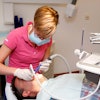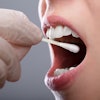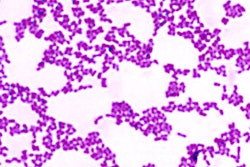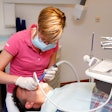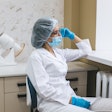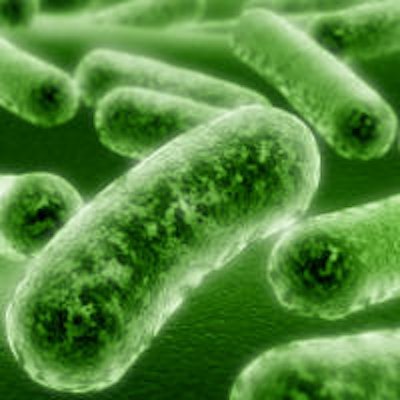
A common amino acid found naturally in food breaks down dental plaque and may be a new weapon against caries and periodontitis, according to a new study in PLOS One (May 6, 2015).
In the study, L-arginine -- found in red meat, poultry, fish, and dairy products -- stopped the formation of dental plaque, according to researchers at the University of Michigan (UM) and Newcastle University in England. L-arginine is already used in dental products to combat tooth sensitivity, they noted.
 Alexander Rickard, PhD, assistant professor of epidemiology, University of Michigan School of Public Health. Image courtesy of the University of Michigan.
Alexander Rickard, PhD, assistant professor of epidemiology, University of Michigan School of Public Health. Image courtesy of the University of Michigan.The researchers conducted a study in which they observed how common oral bacteria flourished among one group of saliva samples, which hadn't been supplemented with L-arginine, and how it handled another group that had. They found a substantial disintegration of bacteria in the L-arginine group, suggesting possible benefits of putting it in consumer health products such as toothpaste and mouthwash.
"Bacteria like to aggregate on surfaces to form biofilms, and dental plaque is a biofilm," senior study author Alexander Rickard, PhD, assistant professor of epidemiology at the UM School of Public Health, told DrBicuspid.com. The research team included three master's students in the UM's epidemiology program.
These biofilms are responsible for the formation of caries, gingivitis, and periodontal disease. Surveys indicate that nearly 24% of adults in the U.S. have untreated dental caries, and about 39% have moderate to severe periodontitis, a number that increases to 64% for those older than 65. When bacteria grow together, they form a biofilm, which is more resistant to antimicrobials, he said.
"We can either use L-arginine as is to make biofilm fall apart, or we could augment antimicrobials with it to allow it to penetrate and have greater effect," Rickard said.
Antimicrobial resistance
Most treatments to control dental plaque use antimicrobial agents such as chlorhexidine -- chemicals aimed at killing plaque bacteria -- but they can affect the sense of taste and stain teeth. Antimicrobial treatments also have been the subject of debate about overuse in recent years.
But using a natural amino acid such as L-arginine could avoid the development of antimicrobial resistance, the study authors noted.
“Instead of trying to kill microbials, let's try to instead diassemble them.”
"L-arginine is a building block for life. We're just changing the concentration, increasing it to high levels," Rickard explained. "That changes the properties of bioflims and how they interact with the surface of teeth. The biofilms fall off; they can't maintain their stickiness. It's kind of cool. Instead of trying to kill microbials, let's try to instead diassemble them."
L-arginine could potentially be used to destabilize biofilms in other environments, such as wounds, catheters, and other medical situations, the study authors noted.
"Biolfilms are ubiquitous; they're everywhere," Richard said. "Many properties that bring them together are the same, in mouth, as well as elsewhere in the body. Certain mechanisms are the same. If we can target a common mechanism, it could be used in variety of locations."
"We demonstrated that L-arginine monohydrochloride (LAHCl) does not kill or damage biofilm bacteria but instead appears to destabilize the biofilm in a concentration-dependent manner," the researchers concluded. "The use of LAHCl to instead destabilize multispecies oral biofilms, resulting in the reduction of biofilm bioburden, represents a potentially desirable alternative to antimicrobial treatments, because the dispersed bacteria will be either swallowed or expelled during cleaning regimens."
Clinical investigations exploring the use of L-arginine salts in antimicrobial formulations also would be potentially fruitful, according to the study authors.
"Given the destabilizing effects of high millimolar concentrations of LAHCl, as well as the increasing demand to develop more efficacious oral healthcare technologies, the prospect of using L-arginine salts such as LAHCl to improve oral health needs to be rigorously assessed," they wrote.
